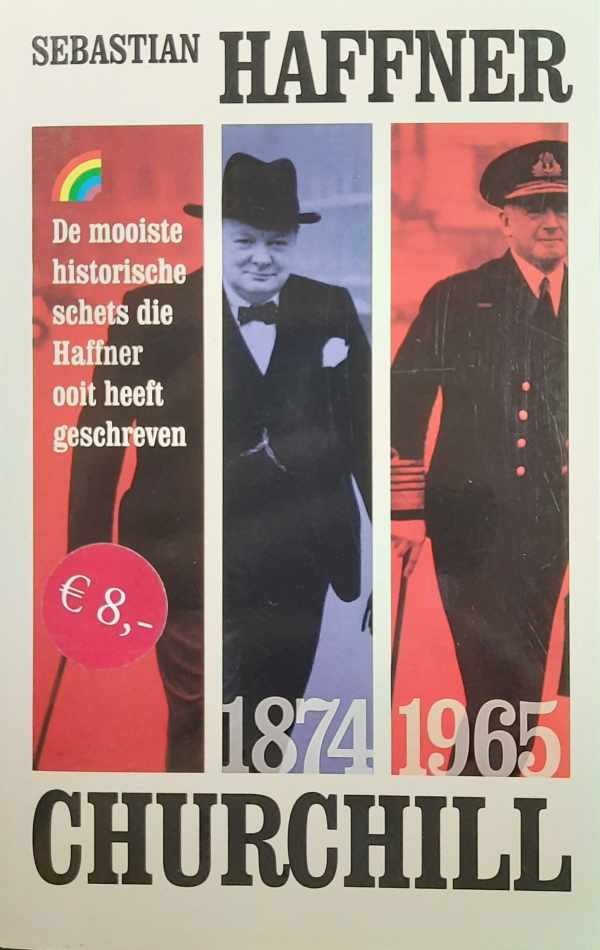



Search our 7.919 News Items
Churchill

Amsterdam
Rainbow
2018
GBR 
condition: Very good/Très bel état/Sehr gut/Zeer goed
book number: 202401231751
Churchill
Uit het Duits vertaald door Jacqueline Godfried. Met nawoord van Bart Tromp.
Pocket, 206 pp. Met chronologische tafel, bibliografie en register. Dit boek verscheen voor het eerst in 1967. Haffner (1907-1999).
Andrew Roberts wrote in The Telegraph about this book:
Sebastian Haffner's superb memoir of growing up in Weimar Germany and leaving when the Nazis came to power, Defying Hitler, was rightly one of the publishing successes of last year. Unfortunately the present work is very different. Perhaps understandably, given his experiences, Haffner sees fascism everywhere. He argues that "the Churchill of the 1920s was really a fascist; only his nationality precluded him from being one in name as well", and that "it seemed likely that Churchill would become European fascism's international figurehead and lead it to sanguinary victory". He also believes that Churchill wanted to "unleash civil war" during the General Strike. In fact Churchill spent half that decade as an unremarkable Chancellor of the Exchequer, whose most "fascist" action during the Strike was to publish a newspaper, the British Gazette. But then according to Haffner, even Churchill's father, Lord Randolph, exhibited "foretastes of fascism". Although Haffner readily acknowledges that Churchill's leadership during 1940 and 1941 was sublime, he argues that pretty much the whole of the rest of his career was flawed. He even thinks Sir Stafford Cripps should have taken over as Prime Minister in 1942.This book presents Churchill as an obsessive warmonger who "slid into his hostility to Nazism" not because he had anything much against Hitler but because he disliked the Baldwin and Chamberlain government's policy of appeasing socialism and Indian nationalism - and thought Germany was just the latest recipient of appeasement.
Pocket, 206 pp. Met chronologische tafel, bibliografie en register. Dit boek verscheen voor het eerst in 1967. Haffner (1907-1999).
Andrew Roberts wrote in The Telegraph about this book:
Sebastian Haffner's superb memoir of growing up in Weimar Germany and leaving when the Nazis came to power, Defying Hitler, was rightly one of the publishing successes of last year. Unfortunately the present work is very different. Perhaps understandably, given his experiences, Haffner sees fascism everywhere. He argues that "the Churchill of the 1920s was really a fascist; only his nationality precluded him from being one in name as well", and that "it seemed likely that Churchill would become European fascism's international figurehead and lead it to sanguinary victory". He also believes that Churchill wanted to "unleash civil war" during the General Strike. In fact Churchill spent half that decade as an unremarkable Chancellor of the Exchequer, whose most "fascist" action during the Strike was to publish a newspaper, the British Gazette. But then according to Haffner, even Churchill's father, Lord Randolph, exhibited "foretastes of fascism". Although Haffner readily acknowledges that Churchill's leadership during 1940 and 1941 was sublime, he argues that pretty much the whole of the rest of his career was flawed. He even thinks Sir Stafford Cripps should have taken over as Prime Minister in 1942.This book presents Churchill as an obsessive warmonger who "slid into his hostility to Nazism" not because he had anything much against Hitler but because he disliked the Baldwin and Chamberlain government's policy of appeasing socialism and Indian nationalism - and thought Germany was just the latest recipient of appeasement.
HAFFNER Sebastian@ wikipedia
€ 7.5


